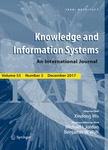版权所有:内蒙古大学图书馆 技术提供:维普资讯• 智图
内蒙古自治区呼和浩特市赛罕区大学西街235号 邮编: 010021

作者机构:Natl Univ Ireland DERI Galway Galway Ireland Vienna Univ Technol A-1040 Vienna Austria Univ Politecn Madrid Madrid Spain Univ Malaga E-29071 Malaga Spain
出 版 物:《KNOWLEDGE AND INFORMATION SYSTEMS》 (知识和信息系统季刊)
年 卷 期:2010年第25卷第1期
页 面:81-104页
核心收录:
学科分类:0711[理学-系统科学] 07[理学] 08[工学] 070105[理学-运筹学与控制论] 081101[工学-控制理论与控制工程] 0701[理学-数学] 071101[理学-系统理论] 0811[工学-控制科学与工程] 0812[工学-计算机科学与技术(可授工学、理学学位)]
基 金:Spanish MEC (now MCI) [TIC-2003-9001, TIN2006-15455-CO3, CSD2007-00022] European Commission [IST-2004-507482, IST-034718] Science Foundation Ireland [SFI/08/CE/I1380] URJC-CM-2006-CET-0300
主 题:Hybrid knowledge bases Ontologies Nonmonotonic rules Semantic web Logic programming Quantified equilibrium logic Answer set programming
摘 要:In the ongoing discussion about combining rules and ontologies on the Semantic Web a recurring issue is how to combine first-order classical logic with nonmonotonic rule languages. Whereas several modular approaches to define a combined semantics for such hybrid knowledge bases focus mainly on decidability issues, we tackle the matter from a more general point of view. In this paper, we show how Quantified Equilibrium Logic (QEL) can function as a unified framework which embraces classical logic as well as disjunctive logic programs under the (open) answer set semantics. In the proposed variant of QEL, we relax the unique names assumption, which was present in earlier versions of QEL. Moreover, we show that this framework elegantly captures the existing modular approaches for hybrid knowledge bases in a unified way.